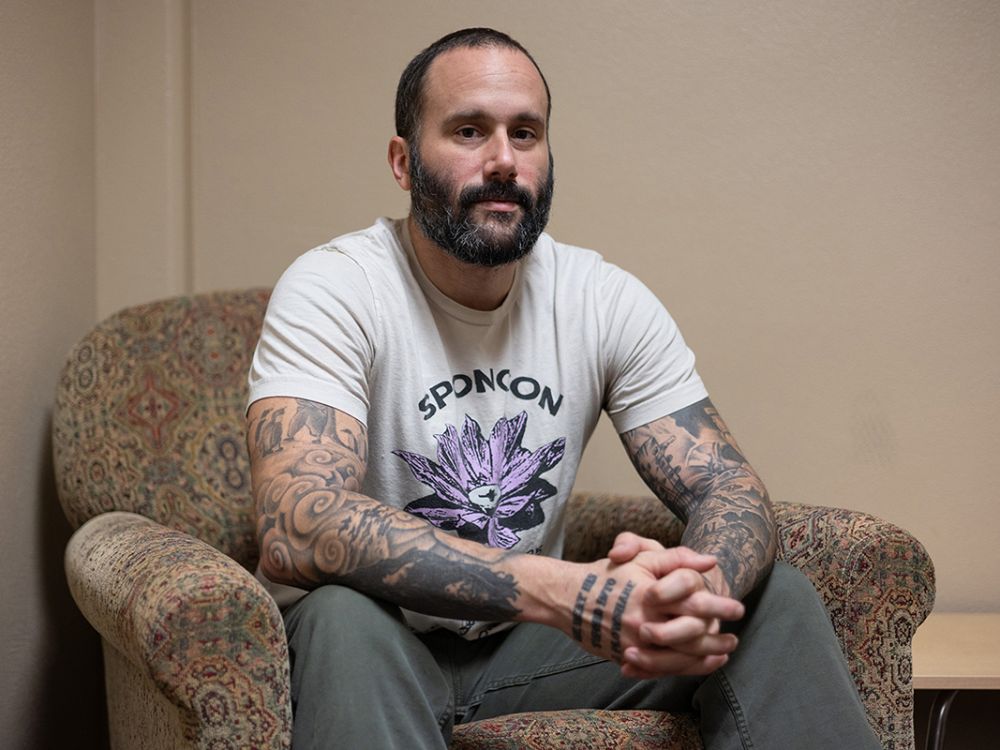MISSOULA – University of Montana student David Payseno grew up on an Air Force base in Goodyear, Arizona. He spent most of his time researching military history, which fascinated him. After graduating high school, he decided to make the armed services his career and enlisted in the U.S. Army as a combat engineer.
“I was always interested in learning about anything military,” Payseno said. “However, I felt there was a gap in my understanding, something I could only learn by experiencing the service for myself.”
Payseno finished basic training in Missouri, then went to Airborne school in Georgia. He was stationed in Fort Bragg, North Carolina, as a member of the 82nd Airborne and then was deployed to Baghdad, Iraq, where he spent the next year.
“It felt like combat in one direction, with us on the receiving end,” Payseno said. “There were all of these rules limiting how we could respond and defend ourselves. It was another situation where control was taken from us, and we suffered a lot from it.”
Payseno finished his service and got a job as a carpenter.
“I wasn’t taking very good care of myself, because I hadn’t taken the time to find my new identity as a civilian after being in the Army,” he said. “My mindset became focused more on how much I could endure, not how I could improve or influence the situations I was in. I had to surrender the sense of ownership and control over my own life, and gaining it back has been a struggle.”
Payseno realized he needed help to navigate his life outside of the military. He decided to attend UM after years as a carpenter. He focused on his mental health early and shifted his focus to overall well-being. He said his transition from the military to becoming a student was not easy.
“It is an overwhelming experience,” said Pat Beckwith, director of UM Military and Veteran Services. “You are learning to take care of yourself for the first time, navigating a university, all while dealing with ambiguity around your future and who you are as an individual.”
Beckwith said no matter the type of military service, veterans face a similar experience when transitioning into a university setting.
“It’s a culture shock and identity crisis all rolled into one,” said Beckwith. “The first semester a veteran starts school is the hardest. This is where we need to connect them with resources and instill a sense of belonging – a sense of confidence they are doing the right thing and are in the right place.
“It’s a very fragile time,” Beckwith added. “People naturally want to go back to a place of comfort. This can mean wanting to return to your old life in the military – something that isn’t always possible.”
Payseno is now working on his practicum in social work for his senior year. His role is as a well-being support coach, veteran transition support coach and peer mentor within the Alexander Blewett III School of Law.
Montana’s law school has a large veteran population. Payseno’s role in the social work program allows him to make recommendations for students to use more resources if needed.
“More than anything I’m a peer, so I don’t need to keep the same professional distance that a clinician does,” said Payseno. “Our shared identity as veterans is what gets us in the room together, but how we connect as individuals is the most important thing.”
The Military and Veteran Services Office pays for several therapy sessions for students who are using their military benefits. Just walking through the door of Curry Health Center can be the hardest part, something a mentor like Payseno can help with.
“Peer intervention is one of the best tools we have in helping transitioning veterans into student life,” Beckwith said. “This is the best way for these students to find community and ultimately succeed.”
Beckwith said a university setting is the best place for people at the end of their careers in the service.
“Where else do you have so many resources and a built-in community to connect with?” said Beckwith. “It’s incredible.”
Payseno’s goal is to complete a master’s in social work and then work with veterans professionally. It’s a goal he is only a few years from completing.
“There’s a value to all of this that I didn’t recognize before I started doing the work,” said Payseno. “It’s not a cure, but it can definitely make things easier.”
If you would like to help support UM Veterans, please donate to Military and Veteran Services Office – GiveCampus at https://bit.ly/UMvetCrowd.
Contact: Phil Stempin, director of events, marketing and communications, UM Alexander Blewett III School of Law, 406-243-6509, [email protected].
